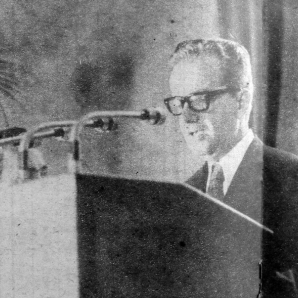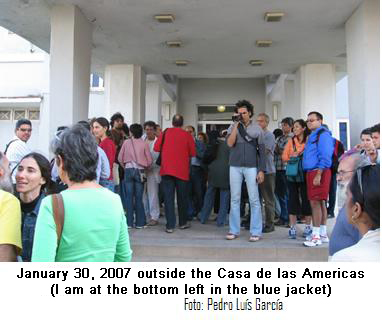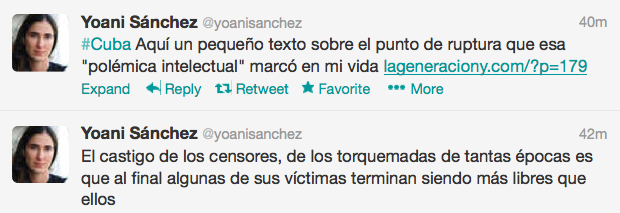“When I close the door, I never know whether I’m inside or outside.”
(Judith Vázquez)
I open the door. The unexpected and inexplicable (and as yet unexplained) return to TV of Jorge Papito Serguera, El Gordo Quesada and Luis Pavón Tamayo, a.k.a. (some say) Leopoldo Ávila, has awoken a logical agitation in Cuban intellectual circles, and this email turbulence has gone beyond the Island’s servers to arrive, as a choral ensemble, on the shores of the Cuban exile – where many of us follow with attention, surprise, and, almost always, anguish what happens in Cuba, for better or for worse. Those of us on this side of the border are up-to-date, if not up-to-the-day. We belong.
On 8 January the first email correspondence between Jorge Ángel Pérez, Reynaldo González, Desiderio Navarro, Sigfredo Ariel and Arturo Arango began to appear on the Internet. Messages come, messages go, the recipient list of such stinging correspondence (at first private, and then public) grew into a very long list of addresses in just a few hours.
Reason tried to impose itself on passion without complete success because ideas were running, rushing around with vibrant impatience, without time to consolidate a firm statement: so intense was the need to advise each other of the danger.
Necessity and consternation. From Havana, these unexpected “resurrections,” or the somber interpretation of the same, were not considered (as I thought from afar) more or less alarming coincidences, but rather clear indications that “some” thought that some past time was better and, compared to the current situation of the country, unpublished and critical, drastic measures should be taken.
The infected areas, for “those of the Old Guard,” were the margins of relative intellectual liberty that local writers and artists had gained thanks mostly to the renewed value of their works and also to personal stances, ever more autonomous, more independent. Titles remain. Also actions.
The shout provoked the echo. In this case, if the echo reverberated from wall to wall it was due to the enormous, thick retaining walls that “official history” has tried to raise throughout thirty years of distorting truth for its own benefit. The shriek bounces and rebounds, it pleases who it pleases and it weighs on those it weighs on.
At times, the resonance is more bewildering than the shout. Just five minutes of Cubavisión prime time entirely dedicated to praising the man (Luis Pavón) who still carries on his conscience the responsibility (not exclusively) of the worst period of cultural politics of the government and the Communist Party of Cuba, was more than enough to open old wounds for many victims of that era.
Memory also has a heart. Memory can also have heart attacks.
One day later, Tuesday, a surge of messages overwhelmed the rivers of the cyber-dialogue and the first handkerchiefs from the exile pump arose – almost all in support. From the pigeon loft where I have lived for 17 years, I sent this email to Reynaldo González:
“Dear Reynaldo: Messenger pigeons arrive atmy rooftop flat in Mexico Cityfrom Havana with references, or parts thereof, to the anger that has been unleashed on the Island by the televised resurrection of Pavón. I listen, excited, to the choir of dignified people. Tell it with my voice, my scars, and my word: add my anger to the anger of friends. Hopefully the waters will return to their level and loose judgements won’t stir up the wasps’ nest – although, if they sting our memory, let’s call bread ’bread’ and wine, of course, ’wine.’ I feel, I am, on the Island and together with you all – as always. If you can, give a hug from me to everyone, to Antón, to Desiderio, to Arturo, to Sigfredo. First to you. Lichi.”
In his response, quick and brief, Reynaldo asked me for “positive energy”.
The author of “Siempre la muerte, su paso breve“, he had reasons to ask me for “positive energy.” I understood that this is what Havana needed: fervor for what is good.
The choir was gaining new voices. Most didn’t question the possible motives of such a ridiculous “return of the ram to the past”in depth,but rather expressed their “solidarity” with writers who had dared to raise a hand and send out the alarm, on time and in haste. At least for me, thesolidarityconcept continues to have deep meaning: it is more than just a word.
However, something must have happened that Tuesday night (they say an urgent meeting in the Ministry of Culture) because on Wednesday the 10th the polemic grew quiet and a heavy silence settled on Havana. Maybe because “the misunderstanding” was cleared up. Maybe. Perhaps.
Perhaps the injustice wasn’t as grave as we thought. Having seen the case and tried the evidence, it wouldn’t be a bad solution. I say there are worse. In silencing Havana, some took advantage of the recess to stretch.
I find Internet space given to various critics who are too severe, in my opinion unjust and for many reasons inappropriate, with self-sufficient resentfulness, that intersperse jabs of intolerable tensionamong undeniable truths. I respect and admire José Prats Sariol and Jorge Luis Arcos. They are my friends. I do not know Duanel Díaz personally, but that is not necessary to appreciate his intelligence and analytical rigor: it is enough to read his writing. As they say in Mexico, colloquially and without offense, I have the suspicion that the three missed an excellent opportunity to be silent.
It was not, it is not, the moment to drown ourselves in a past whose witnesses we remember painfully, and to look for the major people responsible, name them on account and risk. We would all lose this inappropriate suicide bet. Who doesn’t know the rules of the game “by heart”? If I recall them? There’s no need. They haven’t changed in 48 years. Or they have varied only slightly.
What has changed are the players on the field and the spectators in the stands, neither the managers nor the judges. They remain there, on the bench, the old tyrants. But we are in this game, not out of it. “He does not want to be a hero, / not even the romantic around whom / he could weave a legend; / but he is chained to this life and, what terrifies him even more, / fatally condemned to his era,” said Heberto Padilla in his poem “El hombre al margen (The Man on the Margin)”.
Some accept it, others no. Why be embarrassed by it if this is (was and will be) our life? What touched us, those within and those that, for some, decided to leave – or were thrown out. In complex situations like this, how we long for our deaths! How we miss Tomás Guitérrez Alea, our irreplacable Titón, as smiling as he was brilliant! What would he have said? And Jesús Díaz? I seem to hear him. He snorts. And Moreno Fraginals? And Lezama from Trocadero 162? Gastón Baquero warned us, with the innocence of a fish that leaves its testament in the sand, that “culture is a place to meet” and that clear-sighted motto turned into the raison d’tre for the magazine Encuentro.
Also forTemasor Criterios, each in their own way. Had I asked the opinion of Santiago Álvarez, Reynaldo Arenas or Guillermo Rosales, Mirta Aguirre or Juan Marinello or Carlos Rafael Rodríguez, Guillermo Cabrera Infante or Nicolás Guillén, I may not have shared their wisdom or premonitions, but I would have taken them into account because the “respect for different opinions” as it is for Martí, is also fanaticism for me.
I will not try to respond in detail to the articles of Prats, Arcos and Díaz: they needed to write them and express their points of view, well thought out with the advantages that an exercise in reflection provides, and not with the light logic of someone who writes an electronic SOS on the fly. I am only putting forward, through the same Internet path, a pair or trio of observations and dispatching them to the long list of senders implicated in the dispute.
For my good friend Pepe Prats Sariol, “what is not transparent or insinuated in the Aristotelian rhetoric of the reports against the media’s homage to the peacocks is, simply, if they have already lost the little faith remaining in their dome of Power. There it is, it seems, what eludes them.” Who knows. Revolutionaries also can “lose their faith” and not, because of that, stop feeling compromised by what had been, until the light of day, the main reason for living. Hope is salvation for many.
To the author of the excellent and little-known novel “Guanabo Gay,” my favorite among his books, it is evident “that the falcons have flown the coop” and predict that in a few weeks we will know if there will be changes “in the government employees directing the cultural politics of the Government” or not.
And one asks, without arousing the wasps: Are we seeing the renewal of the undisguised repression of artists and writers that the Power knows to be dissidents? Did limbo end?”
Yes, without a doubt, for the time being (I think), purgatory is over, that field of bad weather without visible leaders, angels or demons, in the middle of the sky between hell and paradise.
OK, are they really dissidents? No. Dissidents on the Island are closed in prison or in their houses, valiant, besieged by the same press that today silences the loose polemic on the resurrection of dangerous figures, corralled within fences of repudiation.
Pepe Prats knows it well; he was one of the few that defended and aided our brother Raúl Rivero from his wooden house in the neighborhood of Santos Suárez.
Jorge Luis Arcos does not leave his state of astonishment. For him it is “simply incredible” that this deals with negating what to him seems “evident”: that the events do not “respond to a strategy of power, as it was in the past, and as it is in the present,” and it leads him to suppose “that a considerable part of Cuban intellectuals take it for granted that the current regime is going to continue existing with them in it, in all their varied range of complicity, silence, opportunism or even happy approval.”
The adjustment that Arcos proposes is no different, but rather repetitive. He forgets to mention that, in spite of the sorrows and “due to the many blows that life gives you,” as Fayad Jamis said, many Cuban intellectuals are revolutionaries. And they have the same rights as us to not be. Duanel Díaz focuses his attacks against what is expressed in his letters for Desiderio Navarro, and inverts the spyglass to exaggerate his own sentences (Duanel’s) as if the amplification of a truth was enough to sustain it, while forgetting that, misunderstood, reality seen through a lens at times only serves to distort, not to rationalize.
Díaz strictly guarantees that the Revolution does not allow for “critical conscience”: that to “really criticize it, one has to sit outside the game. It comes from his own tongue: pass from ’Fidel’ to ’Castro’. While ’Fidel’ exists, no longer as a physical, but rather conceptual, provider of legitimacy, the symmetry between ’politicians’ and ’intellectuals’ that Navarro suggests becomes false; in fact, in Cuba, there are no ’politicians’, since there are neither parties nor parliament.”
What is serious is not that there are no “parties” but that there is only one – more an Assembly of Popular Power composed almost in its whole of militants. At these levels of the “party,” after so much rain on what was already wet, in Havana as in Miami, just after having heard the proposal to choose between a name “Equis” and a surname “Zeta”, an alternative that, without the need for myopic lenses, dressed up what was an evidently theoretical obfuscation.
Many years ago, during a visit to a work center in the port of Havana, during exorcisms anticipated by the 4th Congress of the Party, Titón and I were listening to a state director that said, from the tribunal, this foolish musketeer: “All for one and one for all, or what is the same: divide and you will conquer.” What this shows, if need be, is that the extremes have been reached.
The classic goal of unity was identical to its opposite: in dividing into teams, both strategies cancel out. What this implies now is to come together: what remains is lost. It would be a very grave error to mistake our opponents since there exists the possibility of ending by being one, our own enemy. Not counted with me are those who only see spots on the Sun. Someone warned us: “He who looks for truth deserves the punishment he finds.”
I close the door.
Eliseo Alberto Diego
Mexico
Translated by: M. Ouellette





